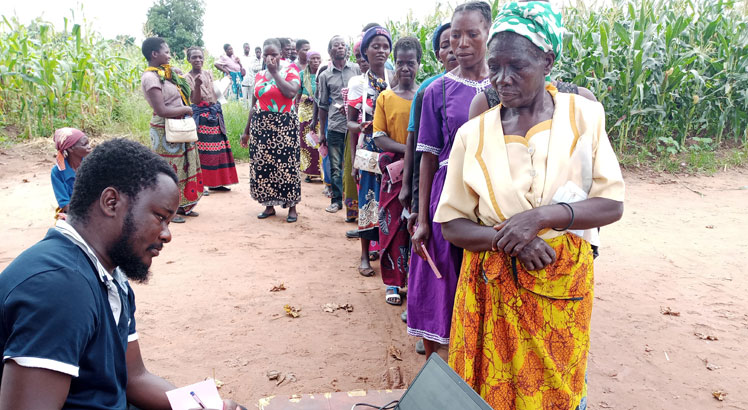The demise of Nelia Zimba’s husband in 2016 left her in dilemma.
With four children to look after, it meant the beginning of a long troubled life for the widow.
She narrates: “As a housewife, it wasn’t going to be easy without a husband who was our breadwinner.
“Everything had come to a stop and my thoughts were on the children.”
When her first-born son was selected to secondary school, Zimba became even more worried about his school fees.
“I recalled the good days when my husband could provide everything we needed. Children deserve a better future, but how can a jobless widow provide for them?” she asked.
In 2018, Zimba started receiving monthly cash transfers funded by the government and its partners to save the poorest of the poor from sliding into dehumanising poverty.
Social cash transfer recipients verify their names during a payout exercise
Thanks to the Social Cash Transfer Programme, she joined a village savings and loan group to multiply her earnings.
As her shares grew, Zimba obtained a loan to venture into pig farming as well as selling fritters and tomato.
This was the genesis of a new life, she states.
“Now I take good care of myself and children. I don’t struggle to pay for their education,” she says.
Zimba receives K8 000 a month, not enough for building a decent home.
She wishes the amount was increased so that the recipients could grow their businesses.
At Mphepo Village in Kasungu West, 83-year-old Tiyankhenji Vula shares a similar story.
She is too old and weak to work as she used to when she was young.
“This house you see was roofed through savings made from the little cash transfers I get every month. My grandchild constructed a house for me, but I used the social cash transfer to buy iron sheets. Now I’m safe and happy,” she explains.
Vula joined a village bank where she saves part of her monthly cashouts and obtains low-interest loans for her well-being.
“The money keeps multiplying as group members borrow with a small interest. At the agreed time, we share the dividends,” she says.
This is how Vula managed to buy iron sheets for her house.
The village loan groups constitute a popular pathway for social cash transfers to grow their cash-outs.
The programme benefits 17 176 households in Kasungu, representing 10 percent of ultra-poor and labour-constrained households.
The beneficiaries receive between K4 000 and K8 000 a month to reduce poverty and hunger.
The initiative also aims to increase the percentage of households eating two or more meals per day as well as those keeping children in school.
In the last five month, 17 049 beneficiaries in Kasungu have received more than K1.7 billion. They are earmarked to get K3.7 billion from this month to March 2024.
District principal social welfare officer Victor Nyirenda says the programme has had a positive impact in poor households, including increased school enrolment.
“We have seen tremendous change in target households. Now some of them own livestock and others produce various crops for their subsistence and commercial purposes,” he says.
Community Savings and Investment Promotion Cooperative Limited (Comsip0 is working hand in hand with the Department of Social Welfare to assist social cash transfer recipients enhance their income and livelihoods through village loan groups and businesses.
Nyirenda says once beneficiaries receive their monthly dues, they “make cash work” to improve their livelihoods.
This parries away fears that cash transfers foster dependency and seldom serves the intended purpose.
Concurring, community social support committee chairperson Happy Phiri states that the programme has transformed many families.
He appeals to government to consider adding more beneficiaries or graduating some to create space for others.
Minister of Gender Community Development and Social Welfare Jean Sendeza thanks development partners for funding the safety net initiative that economically empowers vulnerable households.
“This programme is indeed benefiting our people, especially vulnerable women and the elderly.
“The President [Lazarus Chakwera] also made mention of this in his State of the Nation Address that we need to increase the numbers of beneficiaries,” she says.
Sendeza asks beneficiaries to use the money productively and graduate into self-reliance to pave the way for new beneficiaries.
The post Social protection lifts widows first appeared on The Nation Online.
 Moni Malawi
Moni Malawi 

